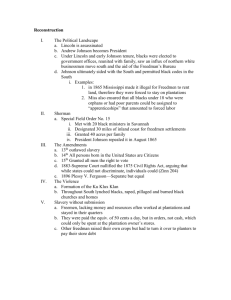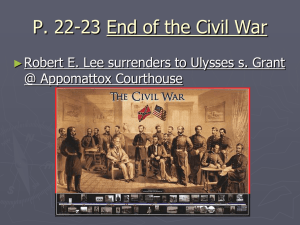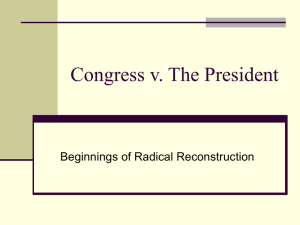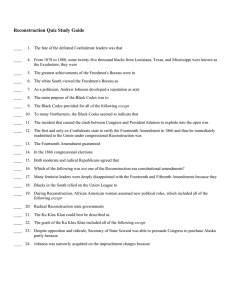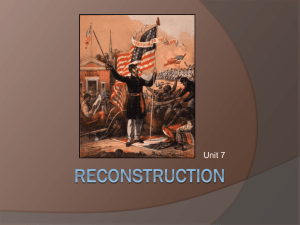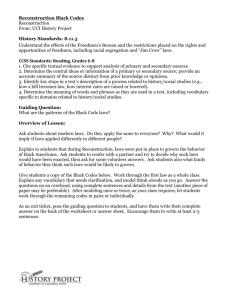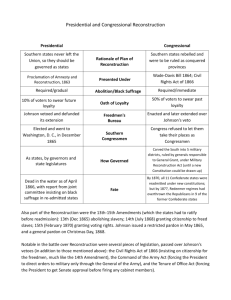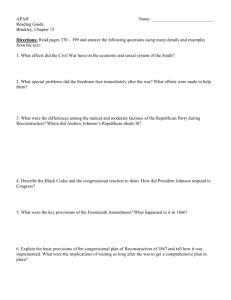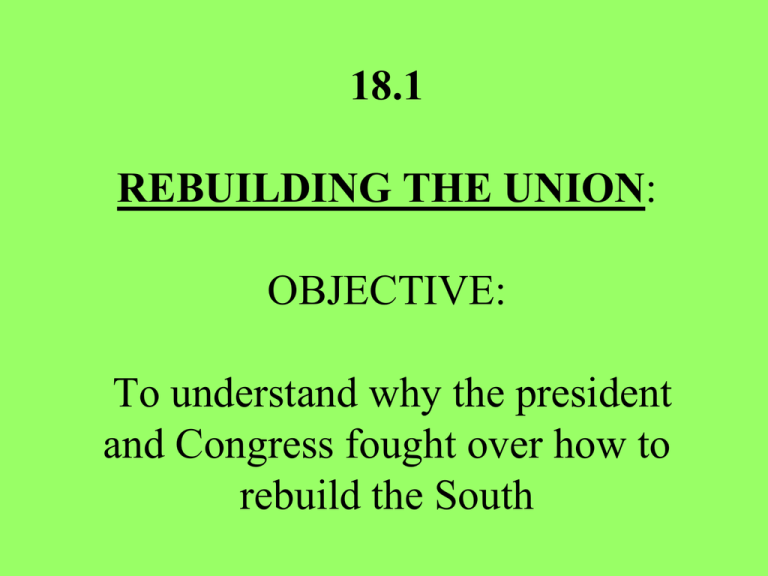
18.1
REBUILDING THE UNION:
OBJECTIVE:
To understand why the president
and Congress fought over how to
rebuild the South
RECONSTRUCTION
•
•
•
•
•
When was Reconstruction?
What is being re-constructed?
How long did it last?
Who did the “constructing”?
Did it work?
Neither party expected for the war the magnitude or the duration which it has already
attained. Neither anticipated that the cause of the conflict might cease with or even before
the conflict itself should cease. Each looked for an easier triumph, and a result less
fundamental and astounding. Both read the same Bible and pray to the same God, and each
invokes His aid against the other. …He gives to both North and South this terrible war as
the woe due to those by whom the offense came, shall we discern therein any departure
from those divine attributes which the believers in a living God always ascribe to Him?
Fondly do we hope, fervently do we pray, that this mighty scourge of war may speedily
pass away. Yet, if God wills that it continue until all the wealth piled by the bondsman's two
hundred and fifty years of unrequited toil shall be sunk, and until every drop of blood
drawn with the lash shall be paid by another drawn with the sword, as was said three
thousand years ago, so still it must be said "the judgments of the Lord are true and righteous
altogether."
With malice toward none, with charity for all, with firmness in the right as God
gives us to see the right, let us strive on to finish the work we are in, to bind up the nation's
wounds, to care for him who shall have borne the battle and for his widow and his orphan,
to do all which may achieve and cherish a just and lasting peace among ourselves and with
all nations.
http://www.yale.edu/lawweb/avalon/presiden/inaug/lincoln2.htm
Second Inaugural Address of Abraham Lincoln (abridged)
Charles Sumner
RADICAL REPUBLICANS
Charles Sumner (left), Senator from Massachusetts, and
Thaddeus Stevens, (right), Congressman from Pennsylvania, led
the Radical Republican faction in Congress. (Portraits from Library of Congress)
What were the goals of the Radical Republicans? (look on page 533)
THE FREEDMEN
• Freedmen’s Bureau lasted from 3/3/1865-1872)
What was the job of the Freedmen’s Bureau?
- distribute food and clothing
- help house
- help educate
- help train for independence
Why did Pres. Johnson veto the Freedmen’s Bureau?
WHO WAS HE?
Pres. Andrew Johnson
• VP to Lincoln in 1864 to
attract pro-Union
Democrats to Union Party
• From Tennessee, slaveowner
• Pro-Union, appointed war
time governor
• Pro states’ rights
Who did Johnson believe
should control and shape
Reconstruction?
Portrait of Andrew Johnson
(Library of Congress)
JOHNSON’S RECONSTRUCTION PLAN
(1865)
• Called “Presidential Reconstruction”
• Required Southern States to:
– Ratify the 13th Amendment
– Accept the supreme power of the federal government
– Pledge loyalty to the United States
• Johnson also granted many pardons of
Confederate leaders-enraging Radical Reps.
HOW WAS JOHNSON’S PLAN DIFFERENT
FROM CONGRESS’ PLAN?
Primary Document
Mississippi Black Code
http://chnm.gmu.edu/courses/122/recon/code.html
Vagrancy Law
Section 1. Be it enacted by the legislature of the state of Mississippi, that all rogues and vagabonds, idle and dissipated persons, beggars, jugglers, or persons practising
unlawful games or plays, runaways, common drunkards, common nightwalkers, pilferers, lewd, wanton, or lascivious persons, in speech or behavior, common railers and
brawlers, persons who neglect their calling or employment, misspend what they earn, or do not provide for the support of themselves or their families or dependents, and all
other idle and disorderly persons, including all who neglect all lawful business, or habitually misspend their time by frequenting houses of ill-fame, gaming houses, or tippling
shops, shall be deemed and considered vagrants under the provisions of this act; and, on conviction thereof shall be fined not exceeding $100, with all accruing costs, and be
imprisoned at the discretion of the court not exceeding ten days.
Section 2. Be it further enacted, that all freedmen, free Negroes, and mulattoes in this state over the age of eighteen years found on the second Monday in January 1866, or
thereafter, with no lawful employment or business, or found unlawfully assembling themselves together either in the day or nighttime, and all white persons so assembling with
freedmen, free Negroes, or mulattoes, or usually associating with freedmen, free Negroes, or mulattoes on terms of equality, or living in adultery or fornication with a
freedwoman, free Negro, or mulatto, shall be deemed vagrants; and, on conviction thereof, shall be fined in the sum of not exceeding, in the case of a freedman, free Negro, or
mulatto, 150, and a white man, $200, and imprisoned at the discretion of the court, the free Negro not exceeding ten days, and the white man not exceeding six months.
Section 3. Be it further enacted, that all justices of the peace, mayors, and aldermen of incorporated towns and cities of the several counties in this state shall have jurisdiction
to try all questions of vagrancy in their respective towns, counties, and cities; and it is hereby made their duty, whenever they shall ascertain that any person or persons in their
respective towns, counties, and cities are violating any of the provisions of this act, to have said party or parties arrested and brought before them and immediately investigate
said charge; and, on conviction, punish said party or parties as provided for herein. And it is hereby made the duty of all sheriffs, constables, town constables, city marshals,
and all like officers to report to some officer having jurisdiction all violations of any of the provisions of this act; and it shall be the duty of the county courts to inquire if any
officers have neglected any of the duties required by this act; and in case any officer shall fail or neglect any duty herein, it shall be the duty of the county court to fine said
officer, upon conviction, not exceeding $100, to be paid into the county treasury for county purposes.
Section 4. Be it further enacted, that keepers of gaming houses, houses of prostitution, all prostitutes, public or private, and all persons who derive their chief support in
employments that militate against good morals or against laws shall be deemed and held to be vagrants.
Section 5. Be it further enacted, that all fines and forfeitures collected under the provisions of this act shall be paid into the county treasury for general county purposes; and in
case any freedman, free Negro, or mulatto shall fail for five days after the imposition of any fine or forfeiture upon him or her for violation of any of the provisions of this act
to pay the same, that it shall be, and is hereby made, the duty of the sheriff of the proper county to hire out said freedman, free Negro, or mulatto to any person who will, for
the shortest period of service, pay said fine or forfeiture and all costs:
Provided, a preference shall be given to the employer, if there be one, in which case the employer shall be entitled to deduct and retain the amount so paid from the wages of
such freedman, free Negro, or mulatto then due or to become due; and in case such freedman, free Negro, or mulatto cannot be hired out he or she may be dealt with as a
pauper.
Section 6. Be it further enacted, that the same duties and liabilities existing among white persons of this state shall attach to freedmen, free Negroes, and mulattoes to support
their indigent families and all colored paupers; and that, in order to secure a support for such indigent freedmen, free Negroes, and mulattoes, it shall be lawful, and it is hereby
made the duty of the boards of county police of each county in this state, to levy a poll or capitation tax on each and every freedman, free Negro, or mulatto, between the ages
of eighteen and sixty years, not to exceed the sum of s I annually, to each person so taxed, which tax, when collected, shall be paid into the county treasurer's hands and
constitute a fund to be called the Freedman's Pauper Fund, which shall be applied by the commissioners of the poor for the maintenance of the poor of the freedmen, free
Negroes. and mulattoes of this state, under such regulations as may be established by the boards of county police, in the respective counties of this state.
Section 7. Be it further enacted, that if any freedman, free Negro, or mulatto shall fail or refuse to pay any tax levied according to the provisions of the 6th Section of this act, it
shall be prima facie evidence of vagrancy, and it shall be the duty of the sheriff to arrest such freedman, free Negro, or mulatto, or such person refusing or neglecting to pay
such tax, and proceed at once to hire, for the shortest time, such delinquent taxpayer to anyone who will pay the said tax, with accruing costs, giving preference to the
employer, if there be one.
Section 8. Be it further enacted, that any person feeling himself or herself aggrieved by the judgment of any justice of the peace, mayor, or alderman in cases arising under this
act may, within five days, appeal to the next term of the county court of the proper county, upon giving bond and security in a sum not less than $25 nor more than $150,
conditioned to appear and prosecute said appeal, and abide by the judgment of the county court, and said appeal shall be tried de novo in the county court, and the decision of
said court shall be final.
Vagrancy Law
Section 1. Be it enacted by the legislature of the state of
Mississippi, that all rogues and vagabonds, idle and dissipated
persons, beggars, jugglers, or persons practising unlawful games
or plays, runaways, common drunkards, common nightwalkers,
pilferers, lewd, wanton, or lascivious persons, in speech or
behavior, common railers and brawlers, persons who neglect their
calling or employment, misspend what they earn, or do not provide
for the support of themselves or their families or dependents, and
all other idle and disorderly persons, including all who neglect all
lawful business, or habitually misspend their time by frequenting
houses of ill-fame, gaming houses, or tippling shops, shall be
deemed and considered vagrants under the provisions of this act;
and, on conviction thereof shall be fined not exceeding $100, with
all accruing costs, and be imprisoned at the discretion of the court
not exceeding ten days.
NEW FREEDOMS
FREEDOM TO OWN LAND
BLACK CODES
Land restrictions
FREEDOM TO LEARN
FREEDOM TO WORSHIP
FREEDOM OF MOVEMENT
Curfews, Vagrancy Laws, Labor contracts
BLACK CODES
Curfews = Generally, black people could not gather after sunset
Vagrancy Laws = Freedmen convicted of vagrancy – that is, not working – could be
fined, whipped, and sold for a year’s labor
Labor contracts = Freedmen had to sign agreements in January for a year of work.
Those who quit in the middle of a contract often lost all the wages they had earned.
Land restrictions = freed people could rent land or homes only in rural areas. This
restriction forced them to live on plantations.
What were the Radical
Republicans worried about?
1. Freedmen counted FULLY, no longer as 3/5 of a
citizen.
2. Southern States will now have more members in the
House of Representatives than before the war.
3. With more new seats in Congress, there is a danger the
South could control the Federal govt. and halt
Reconstruction.
4. The Radical Republicans HAVE to get full
citizenship for African Americans and get them to
vote.
th
14
Why is the
Amendment
important to Reconstruction?
All persons born or naturalized in the United States, and
subject to the jurisdiction thereof, are citizens of the
United States and of the state wherein they reside. No state
shall make or enforce any law which shall abridge the
privileges or immunities of citizens of the United States;
nor shall any state deprive any person of life, liberty, or
property, without due process of law; nor deny to any
person within its jurisdiction the equal protection of the
laws.
What did African Americans
NOT get in the 14th Amendment?
What was Radical
Reconstruction?
Radical Republicans insisted that Southern
States do two things to rejoin the Union:
1.Approve new state constitutions recognizing
the right of all men to vote, white and black
2.Ratify the 14th Amendment
Pg. 536
Map: The Reconstruction
Copyright © Houghton Mifflin Company. All rights reserved.
REPUBLICAN CONGRESS VS.
“ANDY VETO”
•
•
•
•
•
•
South returns “whitewashed rebels” to Congress
Republicans close Congress to “rebels” Dec. 4, 1865
Johnson recognizes Southern states Dec. 6, 1865
Johnson vetoes extension of Freedmen’s Bureau
Johnson vetoes Civil Rights Bill of 1866
Republicans pass 14th Amendment – DOES NOT
GRANT RIGHT TO VOTE TO FREEDMEN!!!
• Johnson defeated in 1866 Congressional Elections
Distinguished Colored Men
What role did African
Americans play in
Reconstruction of the
South’s state
governments?
(look at pg. 536)
Distinguished Colored Men
This lithograph from 1883 depicts
prominent African American men,
several of whom had leading roles in
Black Reconstruction. (Library of
Congress)
Copyright © Houghton Mifflin Company. All rights reserved.
Johnson Impeached (Almost!!!)
• 1867: Congress passes “Tenure of Office Act” to
prevent Johnson from firing Lincoln’s appointees
• Johnson fires Sec. Of War Stanton, a Radical
Republican sympathizer in Johnson’s cabinet
• House of Reps votes 126 to 47 to impeach
Johnson
• Senate fails to impeach by ONE vote
1. The ________ Republicans were
led by
2. Charles S________ and Thaddeus
3. S_________. They wanted to
destroy then power of former
slaveholders.
4. Slavery was abolished by the
____ Amendment.
5. All men were given the right to
vote by the ______ Amendment .

